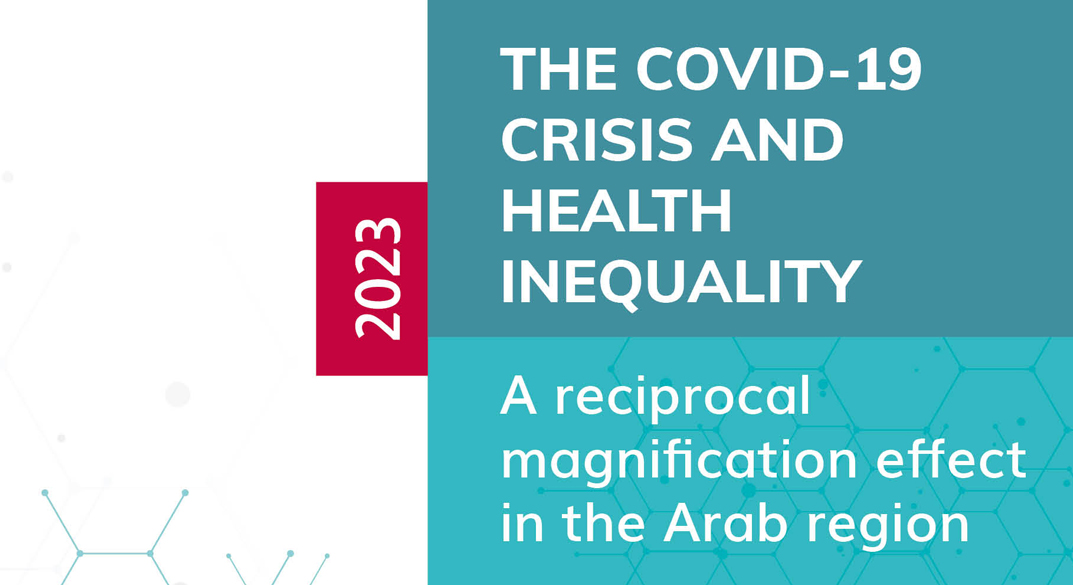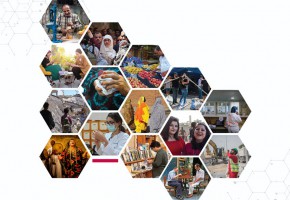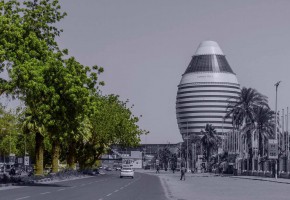
The COVID-19 Crisis and Health Inequality: A Reciprocal Magnification Effect in the Arab Region

The COVID-19 Crisis and Health Inequality: A Reciprocal Magnification Effect in the Arab Region - Farah Al Shami
Please click here to download the full report
This is part of the Arab Watch Report 2023 on the Right to Health.
Introduction
Following the outbreak of the COVID-19 pandemic, the Arab region witnessed an exponential rise in health outcome disparities. The severity of the COVID-19 pandemic was magnified by existing inequalities in chronic diseases and inequities in the social determinants of health. The outbreak of the COVID-19 pandemic in 2019 caused drastic decays in employment, healthcare, education, economic activity, and welfare schemes in the Arab region, all while disproportionately affecting the poorest and the most vulnerable social groups (Kamurase & Willenborg 2021). Being in large part a sanitary crisis, the impact of the pandemic was primarily apparent on health systems and has especially deepened and accelerated health inequality. This translated into uneven infection and mortality rates, uneven access to medical facilities, hospital beds, testing centers and vaccination, as well as discrepancies in the quality of treatments, the competency of medical staff, and the cost burden borne by different social groups, with a direct impact on the right to health (Filip et al. 2022).
The link between income inequality and health inequality was further reinforced by the COVID-19 pandemic. Individuals with lower income often face barriers to accessing quality healthcare such as mobility difficulties and financial constraints, leading to disparities in health outcomes (Kawachi & Kennedy 1999). During the pandemic, these disparities were intensified as individuals with lower income, among others, were more at risk to be exposed to the virus due to correlated occupations or living conditions, and had limited access to healthcare and resources for both prevention and treatment. The pandemic, in turn, worsened income inequality by causing widespread job losses, business closures, and economic downturn, disproportionately affecting the poor. Indeed, the pandemic resulted in approximately 8.8 million people losing their jobs in the Arab region, which further exacerbated economic disparities. Moreover, the pandemic led to an unprecedented increase of 1.3% in the unemployment rate in non-GCC Arab States and left more than 39 million individuals in the region working in hard-hit sectors (Dewan et al. 2022; Abu-Ismail et al. 2021). Notably, the wealthiest 10% of the population now possess 81% of the region's total wealth, compared to 75% of wealth prior to the pandemic (ESCWA 2022a).
In addition, in 2020, Bahrain, the United Arab Emirates (UAE), Yemen, the Kingdom of Saudi Arabia (KSA), Oman, and Kuwait have joined the 20 most unequal countries in the world, which only included Lebanon and the KSA in the previous year (ESCWA 2022b).
Inflation also jumped to high levels in many countries like Sudan (269.3%), Lebanon (150.4%), Yemen (45.0%), and Libya (22.3%), largely due to the pandemic (Dabrowski & Domínguez-Jiménez 2021). Yet, the pandemic overlapped with many other protracted and compounding crises in the different Arab contexts, such as the economic and financial crisis and the August 4 Beirut Blast in Lebanon, the political “de-transition” following Kais Saeid’s self-coup in July 2021 and the inception of a monetary predicament in Tunisia, the economic and currency crisis in Egypt, the water crisis and its subsequent economic volatility in Iraq, as well as the renewal of conflict in regional hotspots. These developments were coupled with economic fluctuations with severe socio-economic repercussions, especially since they were accompanied by an increased cost of living and a wave of subsidy lifting, affecting the price of fuel, food, and medicines due to exhausted public budgets and depleted foreign reserves, which further accentuated inflation and deteriorated people’s purchasing power amid the loss of jobs and livelihood opportunities (Nehmeh/ نعمة2021). While this makes it hard to disentangle the impact of the pandemic on social justice and inequalities, it reinforces the notion of increased inequalities in the aftermath of COVID-19, and especially increased health inequality given its proxy relationship with wealth and income inequality.
Please click here to download the full report
This is part of the Arab Watch Report 2023 on Right to Health.
Recent publications

ANND Newsletter January 2026 - From Davos to the UPR: Between Promises, and Accountability
Related publications


